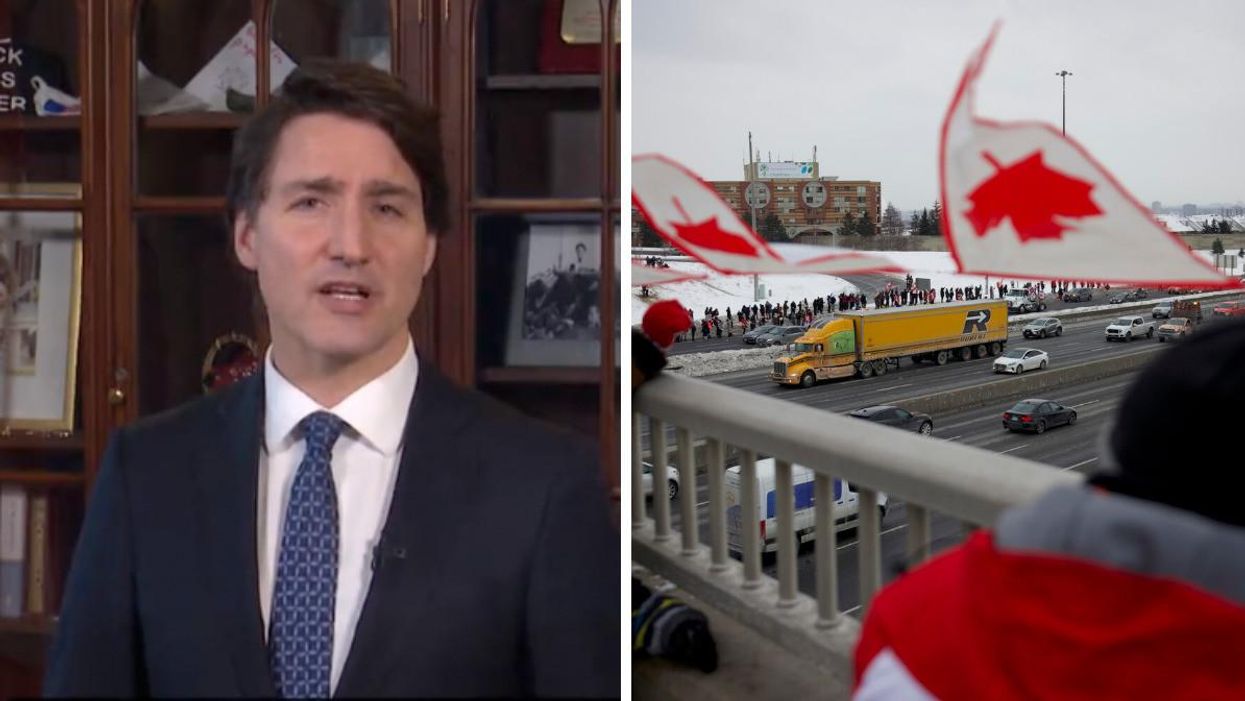Trudeau Just Invoked The Emergencies Act For The First Time Ever & Here's What That Means
He says the Act is used "as a last resort."
On February 14, Justin Trudeau announced that he has invoked the Emergencies Act in response to the ongoing situation across the country involving the Freedom Convoy.
In a press conference on Monday, the PM said that after meeting with his cabinet and caucus, opposition leaders, as well as premiers from each of the provinces and territories, the decision was made to invoke the act.
The Emergencies Act — which was instituted in 1988 to replace the War Measures Act — is an act of parliament that allows for special temporary measures to address issues of national safety and security.
It will "supplement provincial and territorial capacity to address the blockades and occupations," Trudeau said.
I\u2019m giving an update on the work we\u2019re doing to end the ongoing illegal blockades and occupations across the country \u2013 and the support we\u2019re providing to Ukraine in the face of continued Russian aggression. Watch live: https://bit.ly/3sMUXXk— Justin Trudeau (@Justin Trudeau) 1644874434
"These tools include strengthening [law enforcement's] ability to impose fines or imprisonment," said the PM. "The government will designate, secure and protect places and infrastructure that are critical to our economy and people's jobs, including border crossings and airports."
According to Trudeau, the act will allow the government to make sure all essential services can take place, which could include ordering vehicles to be towed from blocking roads.
"Financial institutions will be authorized or directed to render essential services to help address the situation, including by regulating or prohibiting the use of property to fund or support illegal blockades," he added.
He then went on to say what the act does not include and assured Canadians he would not be calling in the military or overriding the Canadian Charter of Rights and Freedoms.
"We are not limiting people's freedom of speech. We are not limiting freedom of peaceful assembly," he said. "We are not preventing people from exercising their right to protest legally. We are reinforcing the principles, values and institutions that keep all Canadians free."
He said that the measure will have a time limit, will be geographically targeted, and will be reasonable and proportionate to the matter at hand.
This is the first time in history that the act has been invoked.
"Invoking the Emergencies Act is never the first thing a government should do, nor even the second," Trudeau noted. "The Act is to be used sparingly and as a last resort."
This article's cover image was used for illustrative purposes only.
- Trudeau Reportedly Wants To Invoke The Emergencies Act & It's ... ›
- Trudeau Has A Firm Message For The People Involved In Blockades ... ›
- Justin Trudeau Assembled An Incident Response Group To Get The ... ›
- Feds Say The 'Consequences' For Joining Blockades Include Frozen Bank Accounts & Jail Time - Narcity ›
- The Emergencies Act Has Been Invoked & Alberta's Premier Has Some Thoughts About It - Narcity ›
- Dairy Queen Store Removes Sign Supporting Freedom Convoy & The Company Is Speaking Out - Narcity ›
- Trudeau Is Ending The Emergencies Act & Says There Will Be An Official Review - Narcity ›

